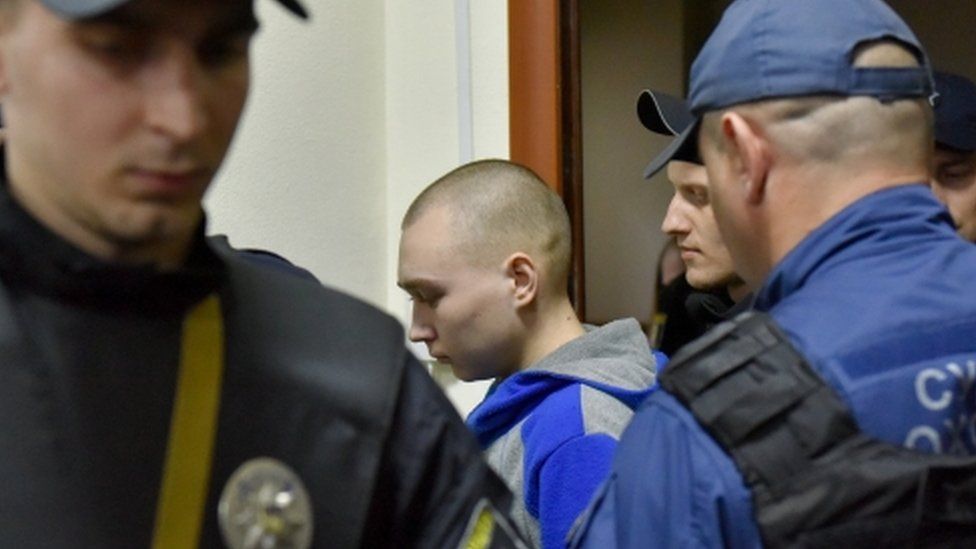Ukraine round-up: Mariupol aftermath and Russian soldier's trial
- Published

Twelve weeks into the Russian invasion, Ukraine began holding its first war crimes trial on Wednesday.
Vadim Shishimarin, a 21-year-old Russian soldier, admitted shooting Oleksandr Shelipov, a 62-year-old man, a few days after the invasion began. He faces life in jail.
The prisoner was brought into the tiny Kyiv courtroom in handcuffs, flanked by heavily armed guards. He looked nervous and kept his head bowed.
The widow of the man killed was sitting just a couple of metres from him.
She wiped tears from her eyes as the soldier entered court, then sat with hands clasped as the prosecutor set out his case, describing the moment Kateryna's husband was shot in the head.
"Do you accept your guilt?" the judge asked. "Yes," Shishimarin replied.
The BBC's Sarah Rainsford was at the trial: click here to read the full story.
Wednesday saw geopolitical developments as well as legal ones, with the EU pledging to spend up to €300bn to end its reliance on Russian gas and oil imports by 2027. The bloc currently gets 40% of its gas from Russia.
With no end to the war in sight, Ukrainian President Volodymyr Zelensky signed decrees to extend martial law and mobilisation for another 90 days in the country, starting from 25 May.
And while Sweden and Finland seek to press ahead with their efforts to join the Nato military alliance, Turkey's President Recep Tayyip Erdogan showed little sign of backing down in his determination to oppose their membership.
Mariupol: The 80 days that left a flourishing city in ruins
After almost three months of relentless assault, Mariupol has fallen. Ukraine's military says its combat mission in the port city is over.
More than any other Ukrainian city, Mariupol has come to symbolise the ferocious brutality of Russia's assault and the stubbornness of Ukraine's resistance.
During those 80 days of siege, daily life was being stripped down to bare essentials. Now some of the people who lived through those times have told the BBC of their ordeal.
Read the full story from the BBC's Paul Adams and Hugo Bachega here.
Mariupol's Azovstal fighters: What next for Ukraine's captured soldiers?
Nearly 1,000 Ukrainian fighters who spent weeks holed up in the Azovstal steelworks in Mariupol have left their positions and handed themselves over to Russian forces and pro-Russian separatists, according to Russia's defence ministry.
The evacuation marks the probable end of the battle for the southern Ukrainian port city, which lies in ruins after weeks of relentless Russian bombardment.
What happens next to the evacuated Azovstal fighters is unclear, with Ukraine calling for a prisoner swap, but some in Russia suggesting they should be put on trial.
Russia's defence ministry says the fighters have been taken to Russian-controlled territory.
Details of the agreement brokered between the two sides, as well as the UN and the Red Cross, are unknown.
Read the full story here.
'I had to stay below ground for more than 60 days'
Katerina spent more than two months with her two sons in one of the bunkers under the Azovstal plant in Mariupol..
Her husband, a fighter, is still thought to be somewhere in the maze of tunnels beneath the complex.
Unable to leave the vast industrial facility, she endured bombardments that felt like they would never end.
"The missiles were so heavy, it felt like the bunker walls were moving and the rooms themselves became smaller," she told the BBC.
Read the full story by the BBC's Laura Bicker here.
Russian gymnast given one-year ban for wearing pro-war symbol
Russian gymnast Ivan Kuliak has been given a one-year ban for wearing a national war symbol on the podium at an event in Qatar in March.
Kuliak earned bronze in the parallel bars final of the Apparatus World Cup in Doha and displayed a letter Z taped to his chest as he stood next to Ukraine's Illia Kovtun, who won gold.
Kuliak must now return his medal, but has a right to appeal within 21 days.
The letter Z became symbolic with Russia's invasion of Ukraine.
It was painted on the side of tanks and military vehicles, as well as being worn by pro-war politicians in Russia.
Click here to read more.
War in Ukraine: More coverage
- BUCHA: The children's camp that became an execution ground
- ANALYSIS: The spy war within the war
- FRONTLINE: Pinned down by Russian fire in key village
- READ MORE: Full coverage of the crisis
- Published17 May 2022
- Published28 April 2022
- Published21 April 2022